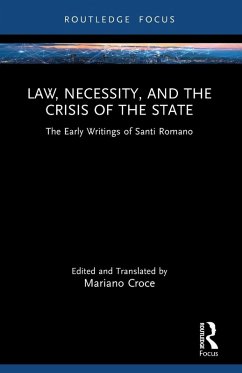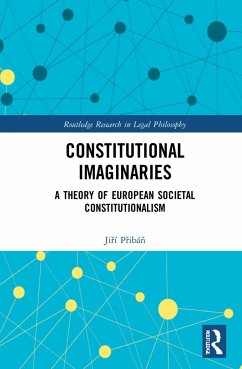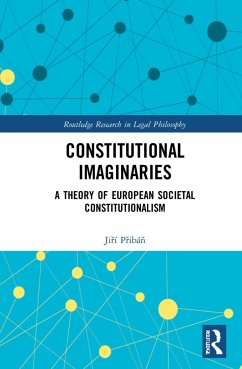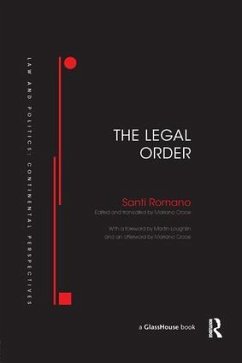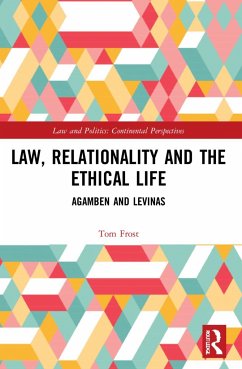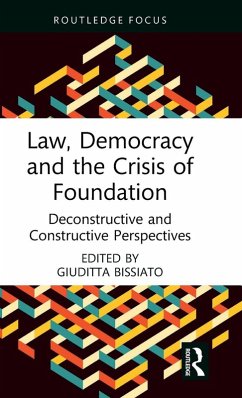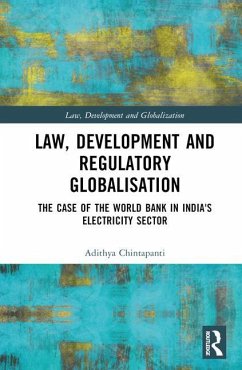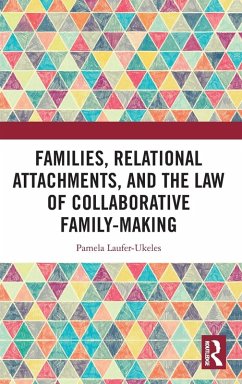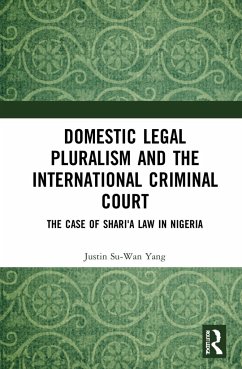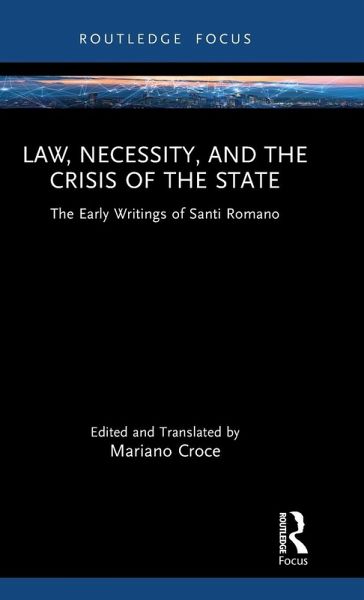
Law, Necessity, and the Crisis of the State
The Early Writings of Santi Romano
Herausgegeben: Croce, Mariano
Versandkostenfrei!
Versandfertig in 6-10 Tagen
59,99 €
inkl. MwSt.

PAYBACK Punkte
30 °P sammeln!
This book contains the first English translations of Santi Romano's important essays, 'On the Decree Laws and the State of Siege During the Earthquakes in Messina and Reggio Calabria' (1909) and 'The Modern State and its Crisis' (1910).Before Santi Romano wrote his masterpiece The Legal Order in 1917-18, he lay the foundations for his ground-breaking theory of law in these two essays, which are still central to scholarly debates about his legacy. The main focus of 'On the Decree Laws' is the concept of necessity as a source of law. Such a controversial view anticipated the much more renowned c...
This book contains the first English translations of Santi Romano's important essays, 'On the Decree Laws and the State of Siege During the Earthquakes in Messina and Reggio Calabria' (1909) and 'The Modern State and its Crisis' (1910).
Before Santi Romano wrote his masterpiece The Legal Order in 1917-18, he lay the foundations for his ground-breaking theory of law in these two essays, which are still central to scholarly debates about his legacy. The main focus of 'On the Decree Laws' is the concept of necessity as a source of law. Such a controversial view anticipated the much more renowned conception of the state of exception advanced later by Carl Schmitt in his Political Theology and has provided a reference point for Giorgio Agamben. The second essay, 'The Modern State and its Crisis', is concerned with the emergence of social forces that the early 20th-century administrative state was struggling to tame. Pursuing an insight that he would develop in The Legal Order, Romano argued that a solution could be found in a public law theory that was able to reconcile the need for a shared constitutional frame with the internal orderings of nonstate movements.
Indispensable for contemporary scholars to understand how Romano's most revolutionary notions came about, as well as to fully appreciate the theoretical import of his concept of law, this book will appeal to legal and political theorists and others who are interested in how law deals and should deal with emergencies and social crises.
Before Santi Romano wrote his masterpiece The Legal Order in 1917-18, he lay the foundations for his ground-breaking theory of law in these two essays, which are still central to scholarly debates about his legacy. The main focus of 'On the Decree Laws' is the concept of necessity as a source of law. Such a controversial view anticipated the much more renowned conception of the state of exception advanced later by Carl Schmitt in his Political Theology and has provided a reference point for Giorgio Agamben. The second essay, 'The Modern State and its Crisis', is concerned with the emergence of social forces that the early 20th-century administrative state was struggling to tame. Pursuing an insight that he would develop in The Legal Order, Romano argued that a solution could be found in a public law theory that was able to reconcile the need for a shared constitutional frame with the internal orderings of nonstate movements.
Indispensable for contemporary scholars to understand how Romano's most revolutionary notions came about, as well as to fully appreciate the theoretical import of his concept of law, this book will appeal to legal and political theorists and others who are interested in how law deals and should deal with emergencies and social crises.



